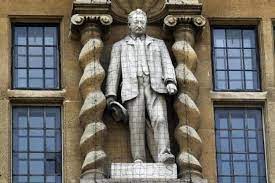Rhodes, 'Rhodesia' and the Oxford dons joining the call to remove a monument to a proponent of British eugenics and imperialism
150 lecturers at Oriel college can't all be wrong in joining the student protesters in condemning moral obstinacy
That the statue of an unapologetic British imperialist who invaded the southern part of Africa, led the way in taking it over, including naming one large section after himself - Rhodesia - in the 1890s (now Zimbabwe), and paved the way for apartheid in what became South Africa, should still be standing after 110 years, at one of the pillars of British higher education that benefited from it - Oriel College, University of Oxford - is an affront to morality.
Just as "Black Boy Lane" and other roads and buildings so-called "The black boy" etc. in London and other parts of England, is an affront.
What is an even greater moral affront is the blindness to these facts even to people whom you would otherwise expect to be intelligent, astute and should have come forward decades ago to remove these symbols of Britain's racist past and present, euphemistically referred to as "colonial"/"imperial" and "coming to terms" respectively. Such as those people who currently comprise the governing body of Oriel and their predecessors back to 1911. And those people who comprise local authorities and their town planning departments up and down the United Kingdom.
Instead, lame excuses based on, of course, money, and 'regulatory hurdles', both of which are concepts conceived of by people, or silence, are relied on for playing the British institutional long game (a particularly well-honed British political skill) and failing to do what is right. That's what the governors of Oriel College did, in recent weeks, in response to years of student protests, calling for that statue to be removed for good.
The British proverb "You can lead a horse to stare but you can't make him drink" and the mantra "Change can't happen overnight" have been among the most relied upon in British institutional life for decades, indeed centuries.
It is refreshing news then, that lecturers at Oriel college, Oxford have decided to stop being bystanders or being seen as good people doing nothing, or worse, complicit, by joining the fray in trying to reverse this stereotypical 'norm' for once. https://www.bbc.co.uk/news/uk-57422751
Institutional Britain has a commendable record on tackling sex discrimination (and climate change, for that matter) but when it comes to race, inertia and excuses for it are the order of the day. The contrast in attitude is stark and rarely talked about. Boycotts on race-related matters, historically, are not something Britain has been very good at, even during the worst of the Apartheid era in South Africa. Remember former and late Prime Minister Margaret Thatcher, ironically, a woman, who infamously refused to impose anything more than the most trivial of sanctions on successive Apartheid governments of South Africa despite the publicised and unpublicised atrocities being committed there during her tenure? The very same Margaret Thatcher was arguing about climate change at that very time.
https://www.margaretthatcher.org/document/107817
Yes, Oxford University has hosted many a civil rights speaker, including the late Dr Martin Luther King Jr., and the late Malcolm X, and the late James Baldwin, in the 1960s but these were all hosted in a debate format, with someone there to argue the opposite case, purely as an academic precursor to the debates of the House of Commons and House of Lords, where some of the students of that time are now MPs and peers. And yes, Oxford, like Cambridge, are old universities with dozens of colleges each, with their own histories, ethos and funding structures. But Oxford's Oriel has no excuse for holding onto a statue of "businessman, politician and benefactor" Rhodes, simultaneously a racist, subjugator, and most likely, murderer and advocate of genocide in the name of British imperialism and prosperity.
So I commend the moral stand these dons, some of whom will be British, some not, have taken. Let's hope it works...and in short order.
© Allswell E. Eno




